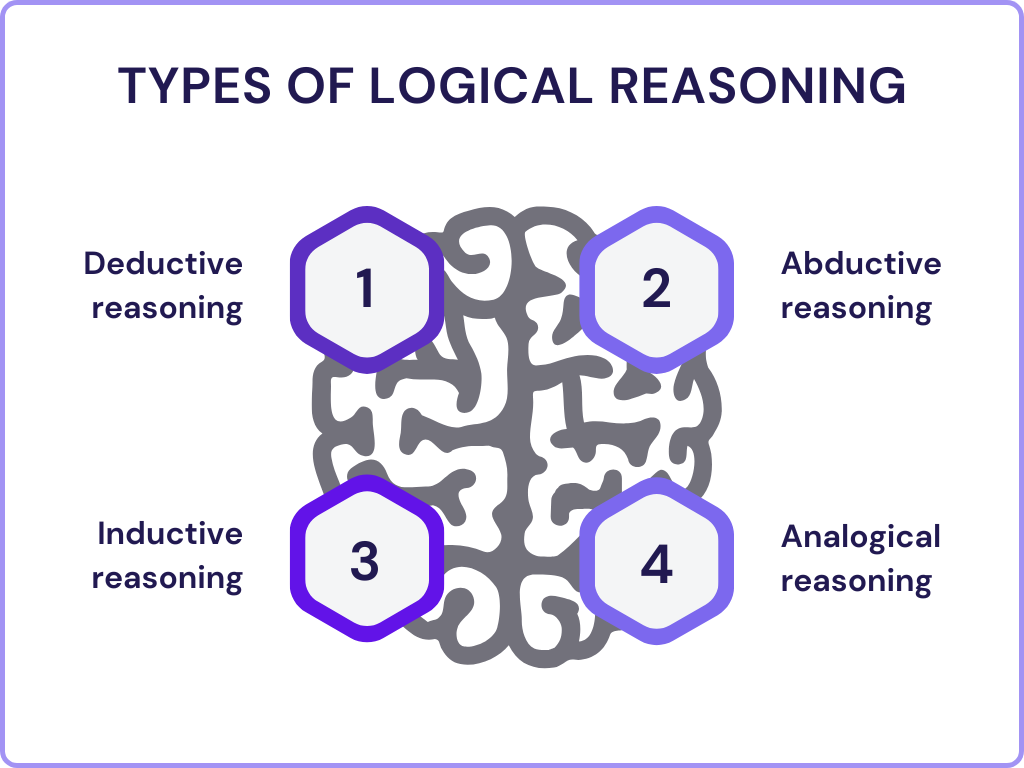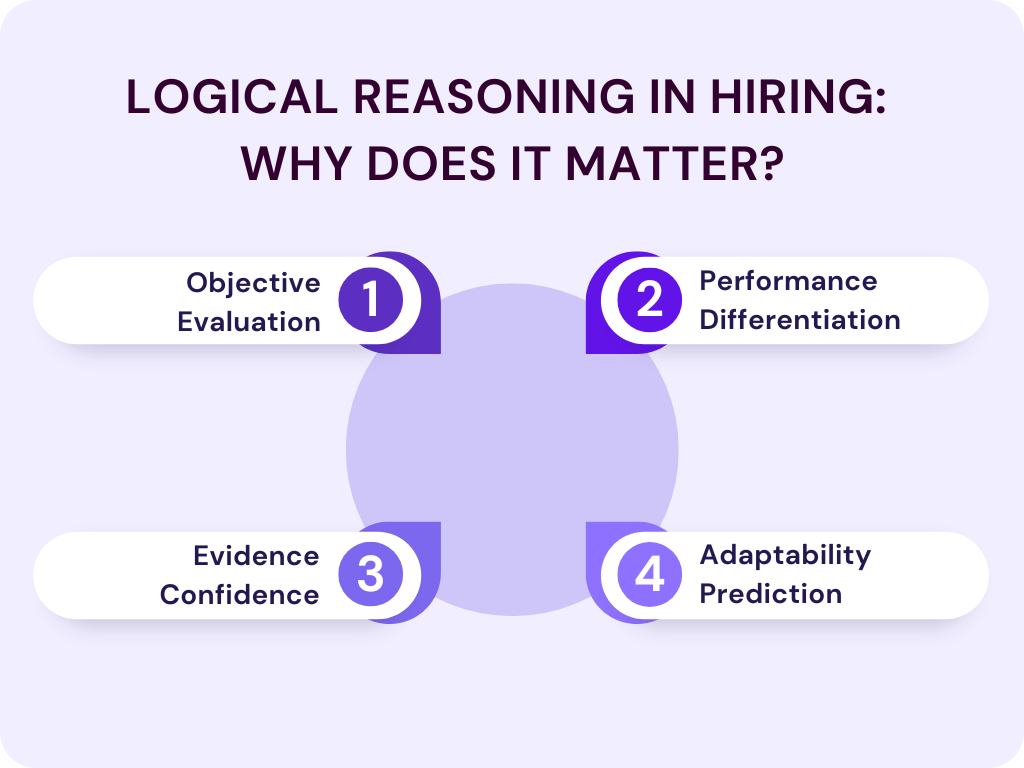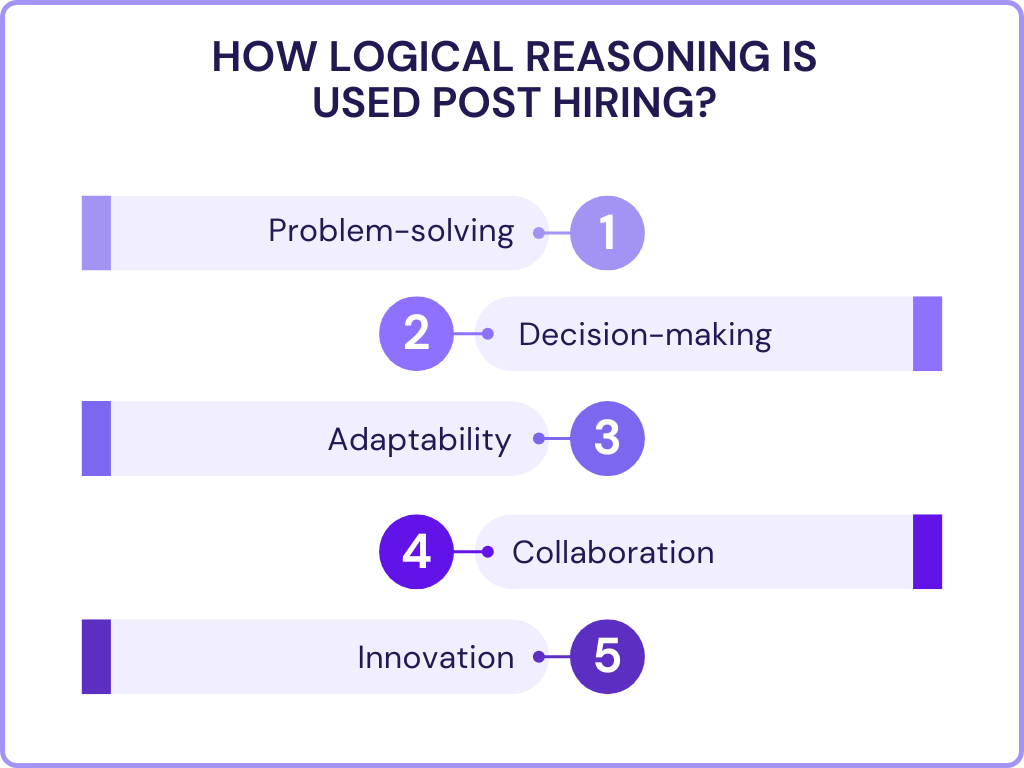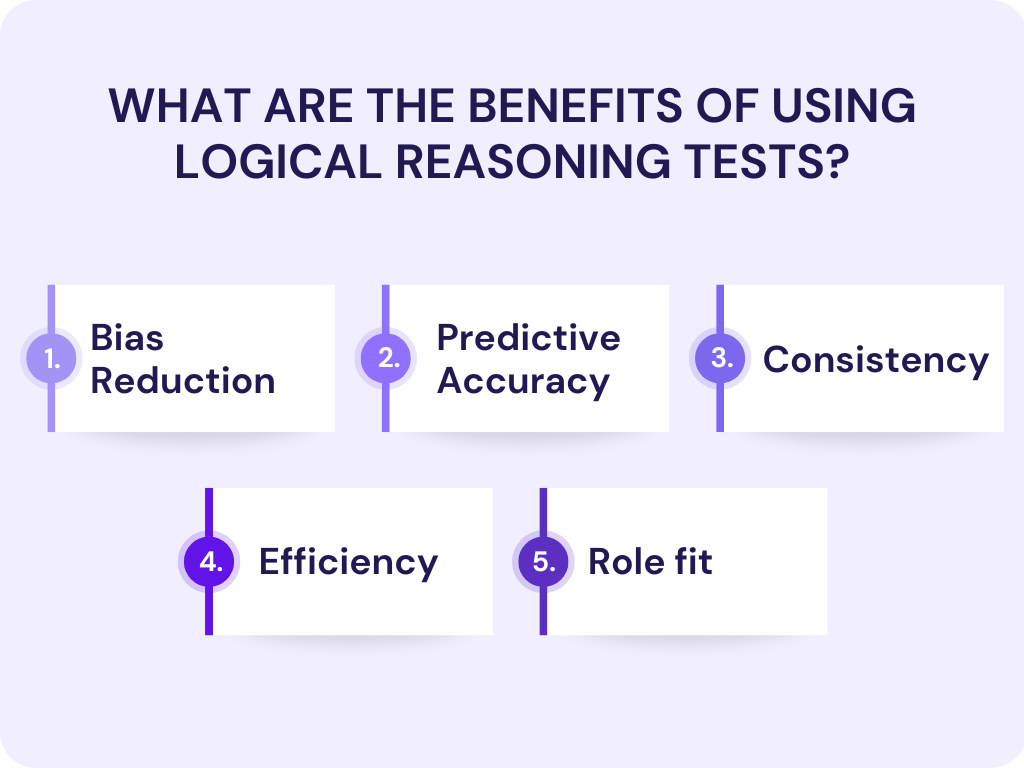
Logical reasoning is one of the most valued cognitive skills in hiring today. It shapes how individuals analyze information, identify patterns, and reach sound conclusions. For HR leaders, understanding what logical reasoning means, the skills it involves, and how it impacts workplace success is critical. This blog explores the meaning of logical reasoning, its different types, examples, and the role it plays in hiring decisions.
What Is Logical Reasoning?
Logical reasoning is the mental process of drawing valid conclusions from available information. It involves applying structured thought to identify relationships, assess evidence, and reach outcomes that are consistent and reliable.
What does thinking logically mean for an individual? It is the practice of setting aside assumptions and focusing on facts, rules, and patterns to solve problems accurately. This skill separates guesswork from informed decision-making.
In professional settings, logical reasoning allows individuals to analyze situations objectively and make choices that drive measurable results, making it highly valuable in both assessments and workplace performance.
Here’s your shortcut to strengthen reasoning in your workforce? Start with our scientifically designed logical reasoning assessments to measure and develop this skill effectively.
Types of Logical Reasoning

Logical reasoning types can be classified into 4 major segments, starting with Deductive reasoning starts with a general rule and applies it to reach a specific conclusion. Inductive reasoning moves from repeated observations toward broader generalizations. Abductive reasoning identifies the most likely explanation when information is incomplete.
Analogical reasoning relies on comparing similarities between situations to make informed decisions. Each type equips individuals with a different way to analyze problems and arrive at rational solutions. Here are some examples of each type of logical reasoning:
- Deductive reasoning – If all managers must complete compliance training, and Ravi is a manager, then Ravi must complete compliance training.
- Inductive reasoning – After reviewing five consecutive months of rising customer complaints, HR concludes there is a broader service issue.
- Abductive reasoning – An employee misses a deadline; the most likely reason, based on partial information, is system downtime rather than negligence.
- Analogical reasoning – A retail company improves customer satisfaction by tracking feedback; a telecom firm applies the same method to boost service quality.
Why Logical Reasoning Is Important in the Workplace
Logical reasoning strengthens workplace decision-making by bringing clarity and consistency to complex tasks. Employees who think logically can prioritize work, analyze data accurately, and respond effectively to new challenges.
Logical reasoning supports accurate decision-making and effective problem-solving. It allows employees to handle complex tasks objectively and adapt to challenges across industries, making it one of the most sought-after skills in modern workplaces.
- Customer support – Enables quicker resolution of complaints through structured problem analysis.
- Finance – Improves risk assessment and forecasting accuracy.
- Technology – Aids in diagnosing system issues and refining technical processes.
- Operations – Enhances prioritization, efficiency, and process optimization.
- Management – Strengthens leadership by supporting balanced and fair decisions.
Click here to read more on how to improve logical reasoning skills effectively, whether for personal growth or team performance.
Logical Reasoning in Hiring: Why Does It Matter?

Logical reasoning in candidates reveals the process of analyzing information, weighing trade-offs, and reaching defensible conclusions—capabilities tied to job performance across roles. Evidence from HR guides and meta-analyses shows reasoning-heavy aptitude tests predict workplace success and support fair, consistent selection decisions.
- Promote objective, bias-resistant evaluation
- Differentiate high performers in complex, time-bound roles
- Improve confidence in selection outcomes via evidence, not intuition
- Complement domain skills to predict adaptability and problem-solving
How to Conduct or Customize Logical Reasoning Assessments
Customize depth and context so tests mirror role realities. Calibrate difficulty, time limits, and item types to the job; use benchmarks linked to performance data; and combine with structured methods for robust, role-fit insights.
- Map competencies (analysis, patterning, inference) to job tasks
- Set difficulty/time based on seniority and stakes
- Add domain scenarios (e.g., operations flows, finance patterns)
- Establish cut scores from historical performance or pilot data
- Pair with structured interviews/work samples for balance
Logical Reasoning Skills in Interviews
Interviews surface the candidate’s thinking-in-action. Use structured prompts that require decomposing problems, articulating assumptions, and justifying choices; evaluate consistency and evidence use. Structured interviewing has stronger validity than unstructured formats.
- Ask scenario questions with constraints (time, data gaps, trade-offs)
- Probe steps: information needed → options → criteria → decision
- Listen for clarity, rule use, and handling of counter-evidence
- Score with anchored rubrics to reduce subjectivity
How is Logical Reasoning Used Post-Hiring?

Logical reasoning continues to matter well beyond the hiring stage. Once employees join, their ability to think logically shapes workplace problem-solving, decision-making, and adaptability in real-world situations. This skill influences collaboration, performance, and growth across roles and departments.
- Problem-solving – Employees analyze challenges and propose structured solutions.
- Decision-making – Teams weigh options and choose evidence-backed strategies.
- Adaptability – Logical thinkers adjust quickly to change and uncertainty.
- Collaboration – Structured reasoning helps resolve conflicts fairly.
- Innovation – Clear, logical frameworks lead to practical improvements.
What Are the Benefits of Using Logical Reasoning Tests?

Logical reasoning tests provide HR leaders with objective data to support hiring decisions. They reduce subjectivity and ensure candidates are evaluated fairly, helping organizations identify individuals with the skills needed to succeed in demanding roles.
- Bias reduction – Shifts focus from intuition-driven decisions to evidence-based evaluation.
- Predictive accuracy – Identifies candidates likely to perform well in complex or high-pressure roles.
- Consistency – Ensures all applicants are assessed against the same logical benchmarks.
- Efficiency – Saves time by filtering unqualified candidates early in the hiring process.
- Role fit – Matches candidates’ problem-solving ability with job-specific requirements.
Final Thoughts on Logical Reasoning in Employment
Every workplace thrives on clear thinking, and logical reasoning provides the framework for it. Teams that approach problems logically reduce errors, work with confidence, and adapt better to uncertainty. In human resources, recognizing and nurturing this skill ensures more reliable outcomes across projects and roles. Looking to evaluate and nurture logical reasoning in candidates? Connect with us at 8591320212 or assessment@pmaps.in









